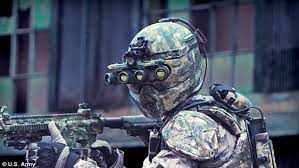The Dawn of the Super Army: Exploring the Future of Military Technology
In the realm of military technology, the concept of a "super army" has long captured the imagination of strategists, scientists, and science fiction enthusiasts alike. The idea of a military force enhanced by advanced technology, artificial intelligence, and superhuman capabilities raises profound questions about the nature of warfare, ethics, and the future of humanity. In this essay, we will explore the concept of the super army, its potential benefits and dangers, and the ethical implications of creating such a force.
 Caption
Caption
The concept of a super army is not new. Throughout history, military leaders have sought to gain an advantage on the battlefield by leveraging the latest technological innovations. From the development of gunpowder to the use of tanks and aircraft in warfare, technology has always played a crucial role in shaping the outcome of conflicts. However, the emergence of technologies such as artificial intelligence, robotics, and genetic engineering has opened up new possibilities for enhancing the capabilities of military forces beyond what was previously imaginable.
One of the key components of a super army is the use of artificial intelligence (AI) to augment the decision-making capabilities of military commanders and soldiers. AI systems can process vast amounts of information and make complex decisions in real-time, enabling them to outperform human operators in many tasks. For example, AI-powered drones can autonomously identify and engage targets with a level of precision that is impossible for human pilots to match. This capability can significantly reduce the risk to military personnel and civilians alike, as well as increase the effectiveness of military operations.
Another crucial aspect of a super army is the use of advanced robotics to enhance the physical capabilities of soldiers. Exoskeletons, for example, can give soldiers superhuman strength and endurance, allowing them to carry heavier loads and operate in extreme environments. Autonomous robots can also be used for tasks such as reconnaissance, surveillance, and logistics, freeing up human soldiers for more strategic roles.
Genetic engineering is another technology that could potentially be used to create a super army. By modifying the genetic code of soldiers, it may be possible to enhance their physical and cognitive abilities, making them faster, stronger, and more resilient. While this technology is still largely speculative, recent advances in genetic engineering have raised the possibility that it could become a reality in the not-too-distant future.
While the concept of a super army holds great promise in terms of enhancing the capabilities of military forces, it also raises a number of ethical concerns. One of the main concerns is the potential for autonomous weapons to be used in ways that violate international law and humanitarian principles. For example, there is a risk that AI-powered weapons could be used to target civilians or engage in indiscriminate attacks, leading to unnecessary suffering and loss of life.
Another ethical concern is the potential for a super army to destabilize the global balance of power. If one country were to develop a significantly more advanced military force than its rivals, it could lead to a new arms race and increased tensions between nations. This could ultimately increase the risk of conflict and undermine global security.
In conclusion, the concept of a super army represents a fascinating and potentially transformative development in the field of military technology. While the idea of enhancing the capabilities of military forces through advanced technology is appealing, it also raises profound ethical questions that must be carefully considered. As we continue to explore the possibilities of a super army, it is essential to ensure that we do so in a way that upholds the principles of international law, ethics, and human rights. Only by doing so can we ensure that the future of military technology is one that benefits all of humanity.



You must be logged in to post a comment.